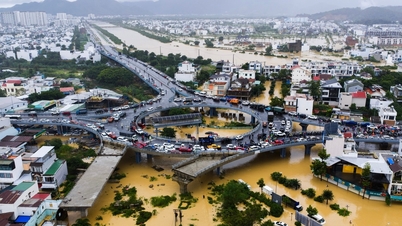With tens of millions of people sweltering in the Northern Hemisphere, July is on track to be the hottest month on record globally. Experts warn that worse is to come unless we reduce our planet-warming emissions.

Forest fire in New Peramos, Athens on July 19. Photo: AFP
Severe heatwaves have gripped southern Europe, parts of the US, Mexico and China this month, with temperatures above 45 degrees Celsius.
In a new analysis of temperatures, scientists from the World Weather Attribution (WWA) group found that heatwaves in parts of Europe and North America would have been almost impossible without climate change.
They found that temperatures in China are 50 times more likely to be caused by global warming. “The role of climate change is huge,” said climate scientist Friederike Otto of the Grantham Institute for Climate Change and Environment, Imperial College London.
Extreme temperatures have swept across much of the Americas - including in some parts of the US, which have endured three consecutive weeks of record temperatures above 43C.
Fires on the mainland and on Greek islands have forced tens of thousands of people to flee, forcing tourists to scramble for evacuation flights and prompting the Greek prime minister to say the country is "at war".
In Beijing, Chinese authorities urged the elderly to stay indoors and children to shorten outdoor playtime to reduce exposure to heat and ozone pollution.
Scientists have determined that climate change – with a global increase of about 1.2 degrees Celsius since the late 1800s – has made heatwaves generally hotter, longer and more frequent.
To track how far the July heat waves in the northern hemisphere have deviated from what would have been expected without that warming, researcher Otto and colleagues at WWA used weather data and computer model simulations to compare today's climate with past climates.
Otto said it was “basically impossible” for such severe heatwaves to occur in the past. “As long as we continue to burn fossil fuels, we will see more and more of these extremes,” she said.
Researchers found that these severe heat waves could now occur about every 15 years in North America, every 10 years in southern Europe and every five years in China.
And they will become even more frequent – occurring every two to five years – if temperatures rise to 2 degrees Celsius, which is expected in about 30 years unless countries meet their Paris Agreement commitments and rapidly cut emissions.
Last week, NASA's chief climatologist Gavin Schmidt told reporters that July 2023 would not only be the absolute hottest month since records began, but also the hottest in "hundreds, if not thousands, of years."
The World Health Organization recently reported that extreme heat is straining health care systems, hitting the elderly, babies and children. The WHO said it was particularly worried about people with heart disease, diabetes and asthma.
Mai Anh (according to AFP, CNA)
Source















































































































Comment (0)